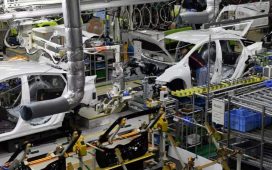Electric vehicle owners across the Midwest are discovering a cold, hard truth this month: When they need their electric cars most, they often don’t work.
Joshalin Rivera can normally drive 273 miles on a 30-minute charge. But she woke up one frigid morning this week to discover that, without even touching her car, the cold had already drained a third of her battery overnight.
She immediately went to her nearest charging station and found a long line of desperate electric vehicle owners waiting in the freezing cold. Some vehicles had already lost all charge, essentially becoming large bricks. “If you’re waiting in that line and you only have 50 miles, you’re not going to make it,” Rivera said. One Chicago tow truck company owner said it was his busiest day in years.
“It’s kind of like, I don’t really want a Tesla,” Rivera said.
The problem with all electric cars, not just Teslas, is that cold weather inhibits the chemical reactions necessary for the battery to generate power. The same is true of gas-powered cars, except that far less energy is needed to get a combustion engine started, and then, once it is going, it is powered by gasoline, which has an extremely low freezing point.
For electric vehicles, however, the battery is responsible for producing all the power the car needs. This means that not only does winter weather reduce the range of an electric car’s battery by up to 40% in some models, but unless you want to freeze to death, the car’s battery is also responsible for heating the car itself, thus reducing the range even further. It’s a double whammy.
Not only do electric vehicle batteries have lower range in the cold, but they also take longer to charge. What is normally a 45-minute charge to bring a battery up to full capacity can take two hours. Hence the long lines and freezing drivers at charging stations.
To avoid waking up to drained batteries on cold mornings, Tesla advises electric vehicle owners to park their cars inside where it is warm. This is great advice for those who have enclosed garages, but most people don’t have that luxury.
Extreme weather can also shorten the life expectancy of an electric car battery. Most batteries sold in the United States come with a warranty. But only for up to eight years or 100,000 miles, whichever comes first. After that, electric vehicle owners are on their own, which can be expensive since the average battery costs $10,000.
CLICK HERE TO READ MORE FROM THE WASHINGTON EXAMINER
The Biden administration is throwing billions of dollars at consumers trying to get them to buy a product that only works nine months out of the year. That is bad enough. But Biden’s policies are even more diabolical. His Environmental Protection Agency has issued regulations mandating that two-thirds of all cars sold by 2032 be electric. This means many people won’t have a choice. Some states, such as California and Virginia, have gone further, banning the sale of all nonelectric cars by 2035.
If drivers want to buy electric cars, they should be allowed to do so. But forcing everyone to adopt an unreliable technology with insufficient infrastructure is self-defeating and cruel. It is almost as though someone wants the public to suffer and their nation to fail.









